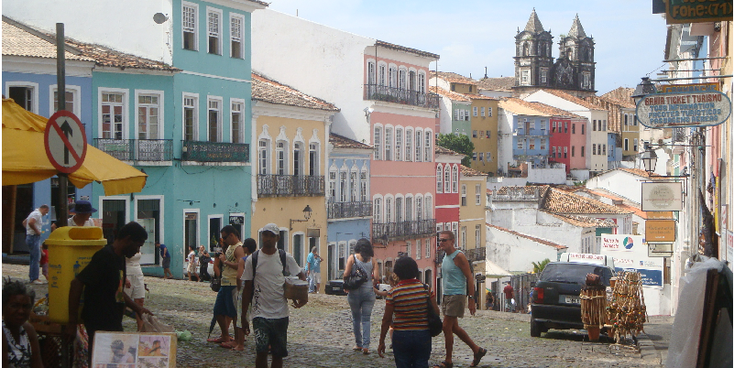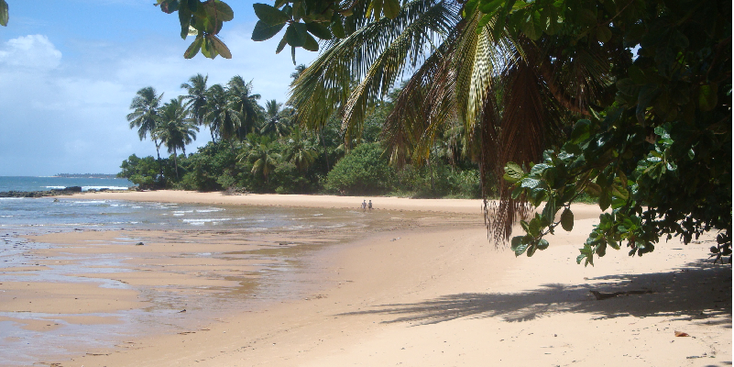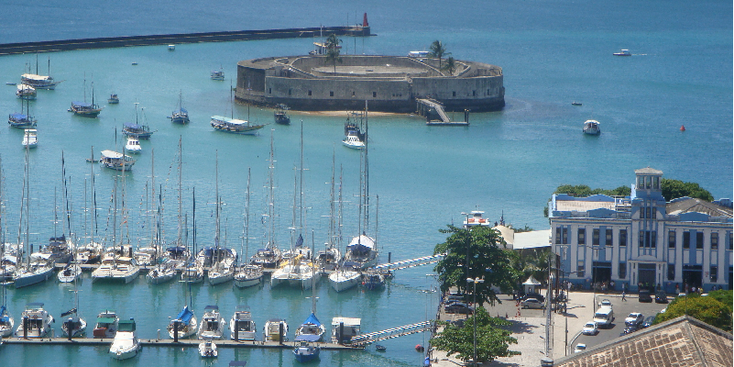Salvador and Barra-Grande
Places of Interest - Brazil


introduction
Salvador de Bahia, as the city is officially called, was for years the capital of Brazil and the most important Portuguese (colonial) city behind Lisbon (in Portugal). Now it is the dark or colored capital of the state of Bahia where the majority of the population is dark in color.
Formed by black slaves it is not surprising that this city houses the African soul in culture, religion and tradition. The latter is clearly expressed in the art of Capoeira and Candomble. The city has a beautiful center with exfoliated bright colored colonial buildings that are still being restored, museums and a very impressive history. Salvador is also very famous for its (African) musical impact and you hear and see daily performances here. It will therefore not surprise you that it is a very popular meeting place at the time of Carnival in the country.
Just outside of Salvador is one of the most beautiful (beach) spots of the country Barra Grande - a paradise on earth where you can walk undisturbed on the wide sandy beaches enjoying swaying palm trees and a crystal clear sky.
highlights

Cidade Alta
The old center, called Pelourinho, of Salvador is a collection of partially restored colonial buildings built on the cliffs of the city. It was here where the Portuguese colonial administration lived and dozens of churches, squares and monasteries were built. You can take a look at the fort, one of the numerous museums, the old slave market but strolling in the old cobbled streets is perhaps the best.
The laid-back atmosphere that hangs there, often pierced by (African) drums and dances will be held by enthusiastic dancers at a sudden starting party on the street. It will not surprise anyone that the old town has been on the UNESCO World Heritage List since 1985 and has been considerably restored.

Candomble
Thousands of different Candombles are organized in and around Salvador-city that have an African religious background. They are often kept in small rooms in city districts far from the center. Some tourists are invited but most of the time you will be sent away. There is (African) dancing, sung on drums often and a number of people get into a trance where the dangerous spirits are driven away from their souls.
These activities can take hours so eat something in advance and make sure there is a taxi or s.th. similar ready to bring you back to your hostel. Put on long, thin and colorful clothes (no shorts). It is a unique experience that you should not miss but be aware of scams.

Barra Grande
Located in a secluded spot Barra Grande is an almost deserted picturesque fishing village with beautiful white sandy beaches, clear sea water and palm tree forests without the “over-the-top” tourist hotels. It starts with the boat trip through what looks like a national park with green overgrown islands and the arrival on the long wooden pier/docks.
The paths are usually unpaved (sandpaths) and there is a very relaxed atmosphere. There are some “pousos” (places to stay), restaurants and a sort of "dancing" in the open air on the beach. About seven kilometers away are the country's top beaches Praia Taipus de Fora, one of the highlights of your visit to this idyllic village.
Other attractions:
- Museo Afro-Brasileiro and Igreja and Convento Sao Francisco.

history

In 1549, the Portuguese landed off the coast of Brazil to establish a capital city in their new country with a city plan, a statue, 400 soldiers, 400 settlers supplemented with some missionaries and prostitutes. The site was built on the very strategic spot on top of the cliffs overlooking the Atlantic Ocean which was perfect for a strong defense.
A city wall was built and slaves were soon put to work on the sugar cane plantations around the city that would remain Brazilian for the first three centuries to come. After the sugar cane, tobacco was grown and there were the gold and diamond mines that made the city prosperous. In the course of the centuries there were several "black" uprisings, also because the number often represented half of the total population.
For centuries, the city remained very important as said but because of its agricultural background it remained behind in the 20th in the rest. Nowadays, in addition to the old city center, new industries are being sought; petroleum, chemicals and tourism are the new pillars in this third city of the country.

tips & advice (2011)

Salvador - Barra Grande: you can take the ferry from Salvador (you first have to go to the suburbs, take the bus to “Soa Joaquim quay”) to Bom Despacho (one way is 6R $ and takes about 50 minutes). There are buses waiting here to travel to Camamu (25 R $ for the three-hour bus trip).
From there, boats (ferries) head for Barra Grande (1.25 hours that go about 1x per hour and cost 6 R $). Easy to do in a day (if you stay in Barra Grande).
Salvador - Lencois (NP Diamantina): There are two buses a day (one in the morning and one in the evening) - to my knowledge this takes about 7 hours.

Of course you can eat at one of the more expensive restaurants in the center (Pelourinho) of Salvador, but if you walk
out of town for a fraction of that you can eat very well in a local "cantina".

-
Name: Alberque do Passo (Salvador)
Address: Rua do Passo 3
Phone: 326 1951
Website: www.passoyouthhostel.com.br
Content:
A very centrally located cozy hostel where you are almost certain to meet other fellow tourists. There are rooms with dorms with a different number of beds. Toilet's and showers are separate. Breakfast is included and is served in the morning (including a delicious juice) at the two tables in the kitchen. It is possible to organize a "candomble" evening here.
-
Name: Pousada Camping Lagosta Azul (Barra Grande)
Price: 10 R $ pp per night (small tent)
Content:
Located on the beach where a beautiful wooden terrace with platform is built; this is a great place at the end of the village. The bay begins and perhaps this is one of the most beautiful places in Barra Grande to spend the night. Behind the main building is an overarching building where you can eat and drink. Then an elongated lawn starts with a toilet and shower block where you can set up your tent. At the back is a sandy path leading to a small road that can go to the "center".

Every Tuesday night it’s party-time in the city of Salvador - in a clearing (open space) close to Largo do Pelourinho is a kind of staircase between a church and a continuous road where a stage is put down and people get cozy together and party. This is a unique opportunity to go between the local people.
Also on other (little) squares bands are playing on little stages where you can dance and drink something. Pay attention to your personal items.

see also:
LANDEN:
EUROPA:
Albanië * België * Bosnië-Herzegovina * Bulgarije * Denemarken * Duitsland * Engeland * Estland * Finland * Frankrijk * Griekenland * Hongarije * (Noord) Ierland * Italië * Kosovo * Kroatië * Letland * Litouwen * Luxemburg * Macedonië * Malta * Montenegro * NEDERLAND * Oekraïne * Oostenrijk * Polen * Portugal * Roemenië * Rusland * Schotland * Servië * Slovenië * Slowakije * Spanje * Tsjechië * Turkije * Zweden
NOORD EN CENTRAAL-AMERIKA:
Chili * Costa Rica * Cuba * Guatemala * Mexico * Nicaragua * Panama * Verenigde Staten
ZUID-AMERIKA:
Argentinië * Bolivia * Brazilië * Colombia * Ecuador * Peru
AFRIKA:
Botswana * Burkina Faso * Egypte * Ethiopië * Ghana * Kenia * Mali * Marokko * Namibië * Oeganda * Senegal * Tanzania * Tunesië * Zuid-Afrika
MIDDEN-OOSTEN:
Iran * Israël * Jordanië * V.A.E.
AZIE:
Armenië * Cambodja * China * Filipijnen * Georgië * India * Indonesië * Japan * Kirgizië * Laos * Maleisië * Mongolië * Myanmar * Nepal * Oezbekistan * Singapore * Sri Lanka * Thailand * Vietnam
OCEANIE:
Voor meer reisfoto's kijk op www.instagram.com/cheapskatetravel.nl:
© Cheapskatetravel.nl; 2018 (all rights reserved)


